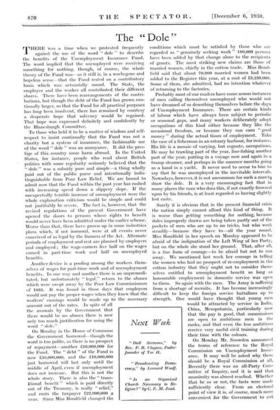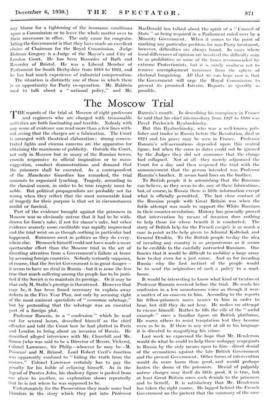The Dole "
THERE was a time when we protested frequently against the use of the word " dole " to describe the benefits of the Unemployment Insurance Fund. The word implied that the unemployed were receiving something for nothing, though, of course, the whole theory of the Fund was—as it still is, in a woebegone and hopeless sense—that the Fund rested on a contributory basis which was actuarially sound. The State, the employer and the worker all contributed their different shares. There have been rearrangements of the contri- butions, but though the debt of the Fund has grown con- tinually larger, so that the Fund for all practical purposes has long been insolvent, there has remained by courtesy a desperate hope that solVency would be regained. That hope was expressed definitely and confidently by the Blazieshurgh Committee.
To those who held it to be a matter of wisdom and self- respect to insist continually that the Fund was not a charity but a system of insurance, the fashionable use of the word " dole " was an annoyance. It did the pres- tige of this country some harm abroad. In the United States, for instance, people who read about British politics with some regularity seriously believed that the " dole " was a subsidy pure and simple—a thing wholly paid out of the public purse and intentionally indis- tinguishable from Poor Law Relief. We are bound to admit now that the Fund within the past year has rushed with increasing speed down a slippery slope. If the unexpectedly terrible increase of unemployment were the whole explanation criticism would be simple and could not justifiably be severe. The fact is, however, that the revised regulations of the present Government have opened the doors to persons whose rights to benefit would never have been admitted under the earlier scheme. Worse than that, there have grown up in some industries' plans which, if not immoral, were at all events never' conceived of as legal by the framers of the Act; Alternate' periods of employment and rest are planned by employers' and employed ; the wage-earners live half on the wages earned in part-time work and half on unemployed benefits.
Another device is a pooling among the workers them- selves of wages for part-time work and of unemployment benefits. In one way and another there is an unpremedi- tated, but unfortunately " legal," return to the abuses which were swept away by the Poor Law Commissioners of 1884. It was found in those days that employers would not pay the proper wages when they knew that the workers' earnings would be made up to the necessary amount out of the rates. In spite of all the avowals by the Government that there would be no abuses there is now only too much justification for using the word " dole."
On Monday in the House of Commons the Government borrowed—though the word is too polite, as there is no prospect of repayment—another £10,000,000 for the Fund. The " debt " of the Fund is now 156,000,000, and the £10,000,000 just borrowed will last only until the middle of April, even if unemployment does not increase. But this is not the whole story. There is also the " trans- itional benefit " which is paid directly out of the Treasury, is really " relief," and costs the taxpayer £22,000,000 A year. Since Miss Bondfield changed the
conditions which must be satisfied by those who are regarded as " genuinely seeking work " 180,000 persons have been added by that change alone to the recipients of grants. The most striking new claims are those of married women, chiefly in the cotton trade. Miss Bond- field said that about 70,000 married women had been added to the Register this year, at a cost of 23,250,000. Some of them, she admitted, had no intention, whatever of returning to the factories.
Probably most of our readers have come across instances of men calling themselves unemployed who would not have dreamed of so describing themselves before the days of Unemployment Insurance. There are certain kinds of labour which have always been subject to periodic or seasonal gaps, and many workers deliberately adopt occupations of this kind either because they like the occasional freedom, or because they can earn " good money " during the actual times of employment. Take the case of a fisherman in an estuary harbour, for instance. His life is a mosaic of varying, but cognate, occupations. He may be trawling part of the year, line-fishing another part of the year, putting in a voyage now and again in a tramp steamer, and perhaps in the summer months going as a hand in a yacht. It never used to occur to him to say that he was unemployed in the inevitable intervals. Nowadays, however, it is not uncommon for such a man to draw the dole. It is a very encouraging fact that in many places the man who does this, if not exactly frowned upon by his friends, is at least regarded as having slightly lost caste.
Surely it is obvious that in the present financial crisis the nation simply cannot afford this kind of thing. It is worse than getting something for nothing, because doles improperly drawn are being taken partly out of the pockets of men who are up to no tricks, but who work steadily—because they have to—all the year round. Miss Bondfield in her speech on Monday appeared to he afraid of the indignation of the Left Wing of her Party, but on the whole she stood her ground. That, after all, is a fine form of courage—to be afraid but not to run away. We mentioned last week her courage, in telling the women who had no prospect of re-employment in the cotton industry that they ought not to consider them- selves entitled to unemployment benefit so long as honourable employment in domestic service was open to them. So again with the men. The Army is suffering from a shortage of recruits. It has become increasingly difficult to keep the foreign service battalions up to strength. One would have thought that young men
would be attracted by service in India,
China, Mesopotathia, particularly now that the pay is good, that commissions arc open, to ambitious men in the ranks, and that even the less ambitious receive very useful civil training during their time with the colours.
On Monday Mr. Snowden announced the terms of reference to the Royal Commission on Unemployment Insur- ance. It may well be asked why there sfinuld be a Royal Commiasion at all. Recently there was an. all-Party Com- mittee of Inquiry, and it is said that unanimity was almoit reached. Whether that be so or not, the facts were made sufficiently clear. From an electoral point of view it is, of course, much more convenient I'M. the Government tei put any blame for a tightening of the insurance conditions upon a Commission or to leave the whole matter over to their successors in office. The only cause for congratu- lating the Government is that they have made an excellent choice of Chairman for the Royal CommissiOn. Judge Holman Gregory is a Judge of the Mayor's and City of London Court. He has been Recorder of Bath and Recorder of Bristol. He was a Liberal Member of Parliament for South Derbyshire frOm 1918 to 1922, and he has had much experience of industrial compensation.
The situation is distinctly one of those in which there is an opportunity for Party co-operation. Mr. Baldwin used to talk about a " national policy," and Mr.
MacDonald has talked about the spirit of a " Council of State " as being required in a Parliament ruled over by a Minority Government. When it comes to the point of marking any particular problem for non-Party treatment, however, difficulties are always found. In cases where fiscal differences of opinion arc involved the difficulty may be as prohibitive as some of the taxes recommended by extreme Protectionists, but it is surely madness not to remove unemployment insurance from the sphere of electoral bargaining. All that we can hope now is that the Government will urge the Royal Conunission to present. its promised Interim Reports as speedily as possible.



























































 Previous page
Previous page